
Anxiety at any time of the year is overwhelming and hard to manage. Yet, holiday anxiety is even more difficult. It tends to make what should be good experiences and memory-making moments challenging. According to the Anxiety and Depression Association, 18 percent of the U.S. population experiences anxiety in any given year. That is equal to 40 million people. About 8 percent of all children and teens will experience it before they are 21 years old. And, just about a third of people who have it actually receive treatment.
This all means one thing – holiday anxiety is something you may have and if so, you need to learn to manage. Contrary to what some may say, it is not possible to just “calm down” or to “get yourself together.” Those who struggle with it often also battle physical symptoms related to the mental health condition. As the most common and pervasive of all mental disorders in the country, recognizing your feelings are real, valid, and important is the first step.
Still, you need to learn to manage holiday anxiety. It may seem nearly impossible to do so, but there are a few key steps that can make it possible for you to get through the holidays.
#1: Know It Is Okay to Say No and to Walk Away
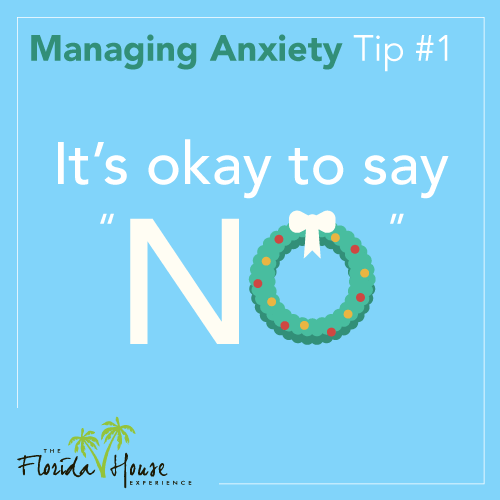 The most important step in managing stress or anxiety during the holidays is to give yourself a pass. That is, if you feel unable to work through the event or to enjoy a family event, then it is okay for you to step aside and excuse yourself. For those who are working through a therapist, you may develop steps and tools to help you to manage these difficult situations. Even still, if your symptoms become significant and you feel you cannot remain in that space, you can leave.
The most important step in managing stress or anxiety during the holidays is to give yourself a pass. That is, if you feel unable to work through the event or to enjoy a family event, then it is okay for you to step aside and excuse yourself. For those who are working through a therapist, you may develop steps and tools to help you to manage these difficult situations. Even still, if your symptoms become significant and you feel you cannot remain in that space, you can leave.
Recognize it is also okay to say no. Sometimes, anxiety worsens when there are too many social interactions or too many tasks on your list to manage. In these situations, it becomes necessary for you to tell others you simply cannot participate or engage. It is not possible to excuse yourself from every situation, in most cases, but removing some of the stressors can help to minimize the effects on your overall wellbeing.
#2: Mind Your Physical Health
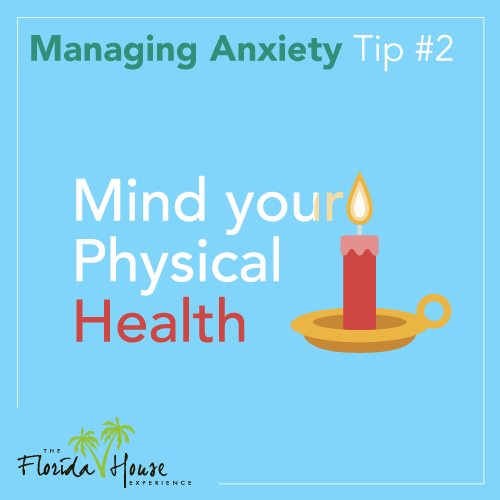 The next step is to monitor what is happening to your body physically. Many people do not make the connection between physical and mental health often enough. However, the holidays are also the time when you are going to be exposed to colds and the flu. This can wear down your body physically. It also makes it harder for your mind to manage the stresses of this time of the year.
The next step is to monitor what is happening to your body physically. Many people do not make the connection between physical and mental health often enough. However, the holidays are also the time when you are going to be exposed to colds and the flu. This can wear down your body physically. It also makes it harder for your mind to manage the stresses of this time of the year.
The opposite is true, too. Knowing this will be a stressful time for you and your family, act on it in a proactive manner. Be sure you are eating highly nutritious foods. Take care of your body. Get enough sleep each night. When you do this, you give your body the nutrients it needs to maintain health. This is not just physical health but also includes mental health. You may be able to overcome some of the stresses you feel simply because your body is more capable of dealing with it.
#3: Don’t Use Substances to Minimize the Impact
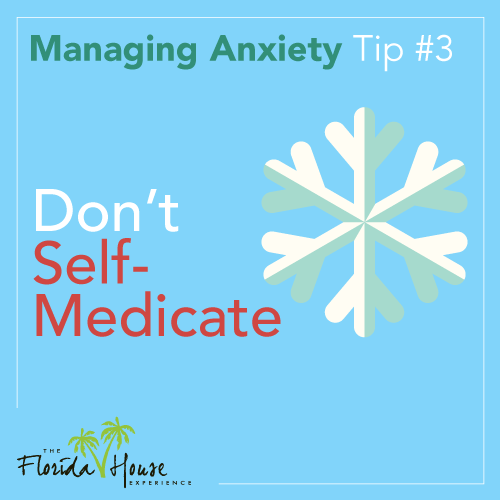 Anxiety is a type of mental health illness. Many people try to cope with or treat their mental health using alcohol and drugs. Doing this only leads to addiction. During the holidays, it is very common for alcohol to be readily available. And, taking a few drinks may seem to help numb the anxiety and tension you feel. Yet, this does not improve your overall health. In fact, it can make you more prone to developing an addiction.
Anxiety is a type of mental health illness. Many people try to cope with or treat their mental health using alcohol and drugs. Doing this only leads to addiction. During the holidays, it is very common for alcohol to be readily available. And, taking a few drinks may seem to help numb the anxiety and tension you feel. Yet, this does not improve your overall health. In fact, it can make you more prone to developing an addiction.
Set a limit to any alcohol you plan to drink. Tell someone else about that limit and make sure they help you stick with it. You may find alcohol seems like a quick fix and solution, but it tends only to mask the symptoms long enough for you to get through the next hour. Then, anxiety can worsen as a result of your alcohol or drug use.
#4: Make Some Time for You, Too
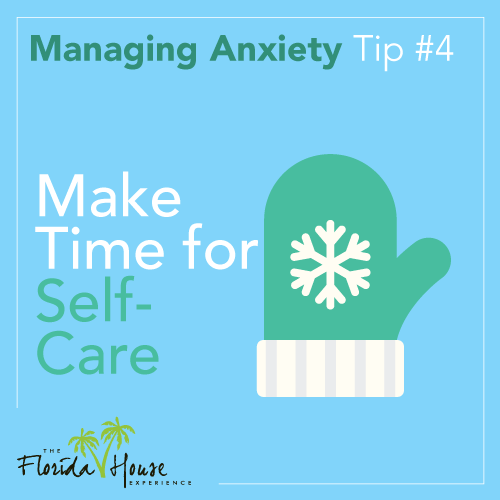 The holidays are not always about celebrating with friends and family. Sometimes, the most important moments are those you tuck away for just yourself to enjoy. If you do not feel you have time for “you” time, make it. When you do, many of the tasks you are overwhelmed about suddenly because easier to manage.
The holidays are not always about celebrating with friends and family. Sometimes, the most important moments are those you tuck away for just yourself to enjoy. If you do not feel you have time for “you” time, make it. When you do, many of the tasks you are overwhelmed about suddenly because easier to manage.
Take a yoga class. Get involved in meditation. You can also benefit from a walk or a hike in nature. The benefit here is that it allows your mind time to calm down. It also allows you to work on focusing on what you really need to do and what may not be as important.
#5: Get the Shopping Out of the Way
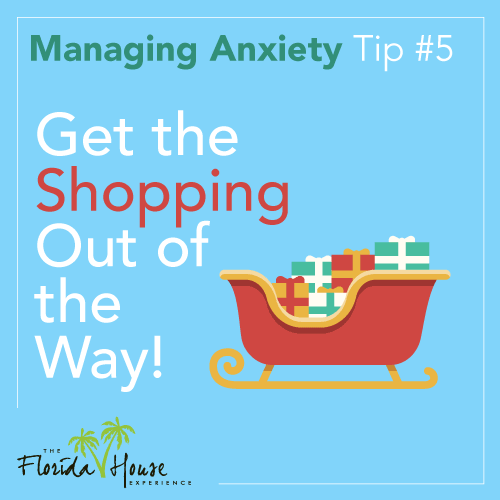 Anxiety and the holidays sometimes go hand-in-hand with shopping. You worry about money, getting the best gift, getting through that crowd, and not getting hit in the parking lot. Your anxiety grows when you have to deal with so many people in such a little amount of time. This is not uncommon.
Anxiety and the holidays sometimes go hand-in-hand with shopping. You worry about money, getting the best gift, getting through that crowd, and not getting hit in the parking lot. Your anxiety grows when you have to deal with so many people in such a little amount of time. This is not uncommon.
No matter if it is shopping or other holiday traditions and tasks, recognize what the underlying concern is. Then, find a way around it. If shopping and crowds rattle you, make a point to shop online or do so early on so you don’t have to worry. If you struggle with all of the food present, set a limit for yourself and reward yourself with non-food items when you achieve your goal. By taking the time to recognize the activities that make the holidays hard for you, you can then develop ways to work around them.
Getting Help for Anxiety is an Option
You do not have to live with the symptoms of anxiety every day. There is treatment help available to you. Even if you suffer from anxiety at the holidays, it is still worthwhile to seek out care from a trained therapist. At FHE Health, we offer the one-on-one support and cutting-edge methods to help you to get the care you need. Contact us to schedule an appointment to discuss your mental health needs with our trusted team.






